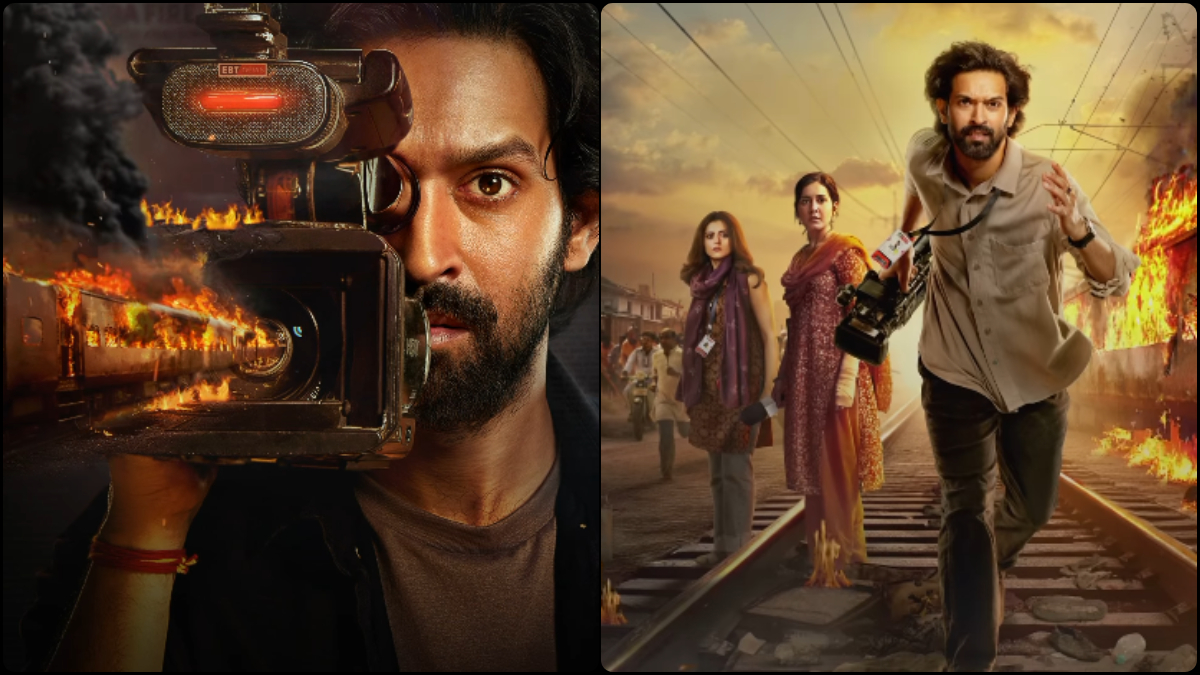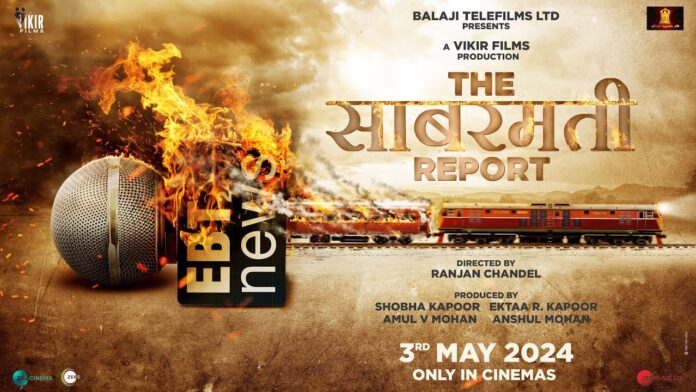The Sabarmati Report, directed by Dheeraj Sarna, is a gripping thriller-drama starring Vikrant Massey, Raashii Khanna, and Ridhi Dogra in pivotal roles. Set against the backdrop of the infamous 2002 Godhra Train Burning Incident, the film delves into the complexities of journalism, ethics, and the pursuit of truth. While it attempts to strike a balance between a fictionalised narrative and real-life inspiration, the film delivers a thought-provoking story with mixed results.
Plot Summary
The story follows Samar Kumar (Vikrant Massey), a modest Hindi-language movie reporter with big dreams but limited opportunities. His personal life is buoyed by his relationship with Shloka (Barkha Singh), but his career takes an unexpected turn when he is offered a position as a cameraman at the prestigious EBT News. This opportunity brings him into the orbit of the enigmatic and influential news presenter Manika Rajpurohit (Ridhi Dogra).

The duo is assigned to cover the Godhra Train Burning Incident, a tragic and polarising event that shook the nation in 2002. Samar’s initial excitement turns to disillusionment as he witnesses Manika manipulate the narrative to align with the channel’s agenda. Driven by his journalistic ethics, Samar independently documents a raw and honest report, showcasing the horrifying aftermath of the tragedy and the plight of the victims.
However, Samar’s report clashes with the channel’s interests and is ultimately suppressed. Undeterred, he secretly ensures that the video is archived, hoping that someday the truth will surface. His defiance costs him his job and reputation, leaving him blacklisted in the media industry. Struggling to make ends meet, Samar takes up odd dubbing assignments, his passion for journalism reduced to bitterness and despair.
Fast forward five years, and the story takes a twist. Amrita Gill (Raashi Khanna), an aspiring journalist at EBT News, stumbles upon Samar’s suppressed report while revisiting the Sabarmati incident. Shocked by the revelations, she seeks Samar’s help to bring the truth to light. But Samar, now jaded and distrustful of the media, grapples with his conflicting emotions—should he trust Amrita, who idolizes Manika, or risk everything once again to expose the truth?
The film explores whether the truth about the Godhra tragedy can prevail against powerful forces determined to bury it.
What Works in The Sabarmati Report
1. Compelling Performances:
Vikrant Massey shines as the earnest and morally conflicted Samar Kumar. His portrayal of a journalist caught between idealism and survival is nuanced and heartfelt. Ridhi Dogra exudes charisma and authority as Manika Rajpurohit, convincingly portraying a journalist who prioritizes influence over integrity. Raashi Khanna brings freshness to the screen as Amrita Gill, delivering a spirited performance that adds vibrancy to the narrative.
2. Engaging Narrative:
The film’s fictionalized storyline, built around the Godhra tragedy, is engrossing. The newsroom drama, power struggles, and ethical dilemmas provide a compelling backdrop. Despite the heavy subject matter, the screenplay manages to maintain a light and breezy tone, making it accessible to a wider audience.
3. Empowering Message:
At its core, The Sabarmati Report is a tribute to fearless journalism. It emphasizes the importance of integrity in the media and acknowledges the challenges faced by reporters, especially those working in regional languages like Hindi. The film encourages journalists to stand up against censorship and manipulation, a message that resonates in today’s media landscape.
4. Strong Production Values:
The direction, cinematography, and background score work in harmony to create an immersive experience. The realistic portrayal of newsroom dynamics and field reporting adds authenticity to the narrative.
What Doesn’t Work in The Sabarmati Report
1. Lack of Subtlety:
The film’s attempt to push a specific narrative sometimes feels overtly preachy. Instead of allowing viewers to draw their conclusions, it spoon-feeds its message, diluting the impact of its storytelling.
2. Inconsistent Pacing:
While the first half of the film effectively sets up the premise, the second half occasionally drags with unnecessary scenes that add little to the central plot. Some subplots feel disconnected, detracting from the overall cohesion.

3. Limited Context for the Incident:
For viewers unfamiliar with the Godhra Train Burning Incident, the film offers minimal historical context. This omission might leave some audiences confused about the gravity and implications of the event. A more balanced exploration of the tragedy could have enhanced the film’s emotional and intellectual depth.
Performances: The Heart of the Film
Vikrant Massey as Samar Kumar:
Massey delivers a standout performance, effortlessly capturing Samar’s journey from an idealistic reporter to a disillusioned outcast. His vulnerability and quiet determination anchor the film, making Samar a relatable and empathetic character.
Ridhi Dogra as Manika Rajpurohit:
Dogra brings gravitas to the role of Manika, embodying the persona of a seasoned journalist who thrives in a high-stakes environment. Her commanding screen presence and confident portrayal add layers to the character.
Raashi Khanna as Amrita Gill:
Khanna infuses Amrita with energy and optimism, providing a counterbalance to Samar’s cynicism. Her chemistry with Massey adds warmth to the narrative, and her character’s journey from an admirer of Manika to a seeker of truth is well-executed.
The supporting cast, though limited in scope, delivers credible performances that complement the lead actors.
Themes and Takeaways
1. Journalism and Ethics:
The Sabarmati Report underscores the ethical dilemmas faced by journalists in a world driven by corporate agendas and political pressures. It highlights the responsibility of the media to prioritize truth over sensationalism.

2. Truth vs. Power:
The film explores the perennial struggle between truth-tellers and those in power. It serves as a reminder of the sacrifices made by individuals who dare to challenge the status quo.
3. Regional Journalism:
By focusing on a Hindi-speaking reporter, the film sheds light on the challenges faced by regional journalists, who often receive less recognition and respect compared to their English-speaking counterparts.
Verdict: A Thought-Provoking Watch
The Sabarmati Report is not without its flaws, but its strengths lie in its engaging performances, timely message, and thought-provoking narrative. While the film’s political undertones and occasional heavy-handedness may not appeal to all viewers, it succeeds in sparking conversations about the role of journalism in society.
For those interested in newsroom dramas, ethical debates, or stories of resilience, The Sabarmati Report offers a compelling cinematic experience. It is a film that celebrates the courage of truth-seekers while acknowledging the challenges they face in a complex and often unforgiving world.
/movietalkies/media/media_files/2024/11/15/sabarmati-review-2.jpg)
Rating: 3/5
If you’re a fan of thought-provoking thrillers with a social message, book your tickets now to watch The Sabarmati Report, playing in theaters near you.

